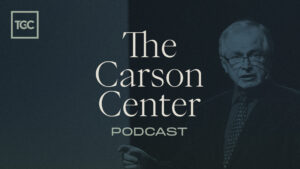Kent Hughes examines Genesis 2:18–25, discussing the biblical foundation of marriage. He emphasizes the complementary roles of man and woman, the significance of the marital bond, and how marriage reflects God’s design and purposes. Hughes encourages couples to model their relationships on the principles outlined in Genesis, highlighting mutual support, unity, and the sacredness of the marital covenant.
The following unedited transcript is provided by Beluga AI.
The scripture this morning is found on page 2 of your Pew Bibles, Genesis 2:18-25. Would you please stand as we read the word of God together?
18 Then the Lord God said, “It is not good that the man should be alone; I will make him a helper fit for him.” 19 Now out of the ground the Lord God had formed every beast of the field and every bird of the heavens and brought them to the man to see what he would call them. And whatever the man called every living creature, that was its name. 20 The man gave names to all livestock and to the birds of the heavens and to every beast of the field. But for Adam there was not found a helper fit for him. 21 So the Lord God caused a deep sleep to fall upon the man, and while he slept took one of his ribs and closed up its place with flesh. 22 And the rib that the Lord God had taken from the man he made into a woman and brought her to the man. 23 Then the man said, “This at last is bone of my bones and flesh of my flesh; she shall be called Woman, because she was taken out of Man.” 24 Therefore a man shall leave his father and his mother and hold fast to his wife, and they shall become one flesh. 25 And the man and his wife were both naked and were not ashamed. (Genesis 2:18-25, ESV)
This is the Word of God.
There is a line from “The Merchant of Venice,” which I have several times committed to memory, and it expresses my regard for my wife.
And it goes like this, “For she is wise, if I can judge of her, and fair she is, if that mine eyes be true. And true she is, as she has proved herself, and therefore, like herself, wise, fair, true, shall she be placed in my constant soul.” Those are lovely words. And my prayer for myself.
Not only does it express my esteem for my spouse, but it also expresses my resolve to place her at the heart of my life as my constant soul, as my Eve, as my wife, living a life which is consonant with the teachings of this book right here in the opening chapters of Genesis. It’s my desire. Now, the text which we are going to look at this morning represents the ancient provision of a helper for Adam and the two becoming one flesh.
And in doing so, it is the well, it is the deep well out of which all the rest of the teaching of Scripture and the family is taken. So this is very primary territory that we have here. And you’ve seen that everything in Genesis thus far has been from God. As we’ve gone through each of the days, God is the actor. Everything is from God. And in this account right here, it is very prominently so because you see God initiated verbs in the text that were read this morning.
In verse 19, the Lord God had formed. In verse 21, the Lord God caused. In verse 22, the Lord God made. And in each case, the title, the Lord God, Yahweh Elohim, which celebrates God as a covenant-making, creating God, takes the initiative to shape man and woman and their relationship. So, everything here is directly from God. This is primary and vital to human existence. It is truly a genesis of marital understanding. The very well from which we draw.
Now, those six joyous refrains that we’ve gone through in those days in God saw that it was good. Remember, six times in God saw that it was good. In God saw that it was good. It is capped by an expression of perfection at the end of the sixth day. In God saw it was very good.
31 And God saw everything that he had made, and behold, it was very good. And there was evening and there was morning, the sixth day. (Genesis 1:31, ESV)
Leaving the reader unprepared, if you were a first-time reader, for the not good of this text. Then the Lord God said, “It is not good for man to be alone.” That is startling in the text when the text is initially read.
The not good here is strong language. It indicates not only absence of something good, but the not good indicates a deficiency. Now, what you have here is all of God. This is God’s observation. This not good observation. It’s very important to see that. He didn’t consult Adam. Indeed, it may be that Adam didn’t have any idea that it was not good to be alone. In fact, you might be able to say, he didn’t know he was alone.
18 Then the Lord God said, “It is not good that the man should be alone; I will make him a helper fit for him.” (Genesis 2:18, ESV)
The reason that you say that is that he had every bountiful provision that you could possibly have, and he had a whole zoo of animals that adored him, and he adored around him. So God wasn’t responding to Adam’s complaint. It was God’s sovereign, unilateral assessment that it wasn’t good for him to be alone. You say, why? Maybe it’s rooted in the person of God, the plurality of God, and Adam was made in His image. And so plurality, possibly that. I think there’s some reasons later in the text.
But whatever the exact reasons for Adam’s aloneness not being good, God’s unilateral, sovereign resolve is unequivocal at the end of verse 18: “I will make a helper suitable for him.”
So lest anybody think that this word “helper” is demeaning, or diminishing, or servile, you need to understand this word “helper” is oftentimes used of God in relationship to Israel. God is described as a helper in relationship to their enemies. In fact, Moses said God was his helper in conquering Pharaoh. So man’s helper cannot be understood to be a weak sister under any circumstances.
It’s a powerful term. The function of this Helper is to be complementary to man. you’ll notice in the text, “A Helper suitable for Him.” Literally, a Helper according to His opposite. In other words, the Helper would be a corresponding counterpart. And as a counterpart, the Helper would share in His nature. Now, male and female were created in the image of God, we already understand from Genesis 1:27.
27 So God created man in his own image, in the image of God he created him; male and female he created them. (Genesis 1:27, ESV)
And as matching opposites, they would supply, she would, the Helper would supply what is missing in Him.
So, what God does right here, right at the beginning on this teaching on marriage and family, is He declares that help was on the way from one who would be both like and unlike man, whose corresponding differences would make man complete for what God had him to do. Perhaps you’ve been puzzled by the Apostle Paul’s statement in the New Testament. He just read the bare statement that man was not made for the woman, but the woman for man. But this is what he’s talking about.
That the woman would make it possible for the man to do what he could never do alone, and likewise for the woman to do what she could never do alone, so that something very, very good was in the works. Now, you’ve got this bachelor that doesn’t know he’s a bachelor. And God decides that He’s going to remedy his bachelor-ness with an awareness program in verses 19 and 20. Now, the Lord God had formed out of the ground all the beasts of the field and all the birds of the air.
This is referring to the sixth day. This references back to the sixth day.
19 Now out of the ground the Lord God had formed every beast of the field and every bird of the heavens and brought them to the man to see what he would call them. And whatever the man called every living creature, that was its name. 20 The man gave names to all livestock and to the birds of the heavens and to every beast of the field. But for Adam there was not found a helper fit for him. (Genesis 2:19-20, ESV)
Now, this considerable menagerie was likely drawn from the area of Eden, maybe even just limited to the garden itself, but it would have been considerable.
A large group of animals, and the process of naming them, naming them for the first time would have been daunting. You see, what happens is that God was the namer in the beginning of creation. He took it on as His sovereign role, and so we found as we went through that that God named light, He named darkness, He named dry land, and it represented His sovereignty over creation, because that was involved in naming in culture. But now, Adam performs the sovereign naming function, so this is no small thing that Adam is called to do.
Now you want to understand that it was challenging, not like what we might think. It challenged his intellectual capacities. Naming demands acquaintance and understanding of the animals. So it wasn’t a whimsical process of reviewing a ten-mile long pet parade and saying, ah, mm, mm, aardvark, that’s what you are. Or chimpanzee, that suits you perfectly. We see A to Z. Zebra! Or pelican, you’re a pelican. And I like that. Adam wasn’t Dr. Doolittle on amphetamines.
There’s a classic work on the Old Testament by some of last century’s German scholars, Keil and Delitzsch, and it points out that we mustn’t regard the names which Adam gave the animals as merely denoting their outward characteristics. I quote, “but as a deep and direct insight into the nature of the animals, which penetrated far deeper than the knowledge which comes from simple reflection.” So, Adam fulfilled his kingly responsibility of interpreting the animals for what they were and gave them appropriate names, and in doing so, honed his differentiating powers.
He was elevated in being able to make distinctions. And as he did this, he saw there was none that corresponded to him, and in the process, he realized that many of the animals had corresponding social companionship that he lacked. And he began to long for companionship with a being like himself, and so I think it is not unreasonable to surmise that he began to have an ache for a corresponding other. He began to imagine it and think about it.
And what God was doing was preparing him to value his helper, to give his helper the highest of esteem with him. When he gets done with this, he’s ready. The five short clauses of verses 21 and 22 describe Yahweh Elohim, that is Jehovah God’s work. So the Lord God caused the man to fall into a deep sleep. And while he was sleeping, he took one of the ribs and closed up the place with the flesh.
Then the Lord God made a woman from the rib He had taken out of the man, and He brought her to the man.” Now a deep, heavy sleep like that of Adam is often in Scripture associated with a divinely induced sleep. That was the slumber that Abraham had when God cut the covenant and passed between the covenant like a smoking torch in the night. The verbal idea here is what happened with Jonah when he was sleeping in that storm. So we see that God is at work and gives him a divinely induced sleep.
Man is not to perceive God in the act. He can’t look at the genesis of what is going to go on here. He’s only going to be able to see the results. The rib.
21 So the Lord God caused a deep sleep to fall upon the man, and while he slept took one of his ribs and closed up its place with flesh. 22 And the rib that the Lord God had taken from the man he made into a woman and brought her to the man. (Genesis 2:21-22, ESV)
The rib is not metaphorical, as some people suggest. It is an actual rib, for, I think, linguistic reasons in the text and also for huge theological reasons. Now, as to whether that rib refers to his side or not is a real question because, most of the places in Scripture, the word rib refers to side.
The only problem here is it says that he took one rib. Well, one rib makes sense, but one side doesn’t make any sense or one of his sides. So, it appears to be a rib. And the language which you get here, you need to allow its full implications to come out. The picture is a long, curved, glistening rib, still moist with Adam’s fluid, and warm with his marrow. “And lest anyone ask me this question after the sermon, men don’t have one less rib than women.”
God closed him up and maybe he lived his life without a rib or it regenerated, but all of his children, you can count them all. Their ribs that is. Now the significances of this, of this whole matter of the rib are many and profound. Adam, you remember, was not created ex nihilo, that is out of nothing. He was created out of the dust of the earth. The woman is likewise not created ex nihilo, out of nothing. Yahweh Elohim made, that is literally built a woman from the rib. That is the word built.
She was made of the same stuff as the man. She was the same bone. She was the same flesh. She was the same DNA. Her correspondence and form, her femaleness, her estrogens were shaped and constituted from the man. Also, Eve was the first person to be created from a living being. Now, because she came from Adam, she was perfectly in the image of God. Their mutual flesh lies behind the earlier Genesis 1:27,
27 So God created man in his own image, in the image of God he created him; male and female he created them. (Genesis 1:27, ESV)
Now that creation of the rib is the basis basis for their equality. Matthew Henry, the old Puritan, coined it, and sometimes you’ll hear this in wedding ceremonies. It’s really beautiful. Not made out of his head to top him, not out of his feet to be trampled upon by him, not out of his side to be equal with him, under his arm to be protected, and near his heart to be loved. That is beautiful. So here it is. And listen closely.
Eve was taken out of Adam so that he, Adam, might embrace with great love a part of himself. Thus the apostle Paul would make this theological statement in the New Testament. He who loves himself, or loves his wife, loves himself. Well, it all happens. Bang, bang, bang, bang. Four short clauses there, and in the fifth clause, which is the last line of verse 22, God completes His work. And He brought her to the man. God Himself, like the father of the bride, leads the woman to the man. That’s the picture. And it is stunning.
She is the prototype of all women, fresh from the wells of creation. Every aspect of her is perfect. She is perfect in body. She is perfect in soul. She is perfectly sinless. And as she stands on the arm, so to speak, of God. She is all there for Adam to behold. So there she is. All of a sudden she’s there. And he’s awake. A little ache in his side, but he is awake. And what you have to remember is that Adam has been carefully programmed and prepared to recognize his need.
So his powers of discernment have been elevated by close evaluation of God’s creatures. So his response is a shout of ecstasy. This is now bone of my bones and flesh of my flesh. She shall be called woman or she was taken out of man. Adam’s rapturous cries are the first quoted human words in the Bible. Not only that, they are the first poetic couplet in the Bible. So he explodes with poetry. Gordon Winham points out that all the standard techniques of Hebrew poetry are present. That is parallelism, assonance and wordplay, chiasmus and verbal repetition.
And that it is in a pronounced rhythmic pattern. In the Hebrew there is a pattern, a rhythm, which is absolutely beautiful. The first line consists of three parts in the Hebrew with two stresses each. The man said, this is now bone of my bones and flesh of my flesh. And the second line has two parts with three stresses each. She shall be called woman or she was taken out of man. And more.
Or, that rhythm belongs to the very cry itself because that explosive surprise comes out in the two beat rhythm while the second verse’s three beat rhythm gives it measured solemnity. So you’re talking about something beautiful here. This is what he says when he sees her, his helper. And Adam’s explosive astonishment, this is now bone of my bones and flesh of my flesh, voiced the traditional kinship formula in Israel of closest kinship. When we talk about close kinship, we’ll talk about a blood relationship, but they would say in Israel flesh and bone.
And he saw her as a mirror of himself, with some very agreeable differences. Sometimes, we think of Calvin as being cold, measured, and theological. Well, listen to what Calvin says. Now, he puts these words in Adam’s mouth: “Now at length, I have obtained a suitable companion,” says Adam, “who is part of the substance of my flesh and in whom I behold, as it were, another self.” Such astonished ecstasy! He had found his sister, his longed-for love, his counterpart, and he is no longer alone. Now, his naming powers had been honed, hadn’t they?
I mean he had to come up, think of the inner essence of what was going on, thinking through and giving a name which is appropriate to each of the creatures that he saw, and so he spontaneously declares here, this is a piece of cake for him, she shall be called woman, ishah, for she was taken out of man, ish. The sound play there celebrates their relationship. Adam restates his own name as embedded in hers and anticipates the deepest intimacy. This is beautiful.
Now, Adam’s shout echoes down through all of the centuries, proclaiming the joy and intimacy of marriage. But here in the text, Adam’s shout subsides, and Moses’ voice concludes in verse 24, “For this reason, a man will leave his father and mother and be united to his wife, and they will become one flesh.” Now, that is a divine revelation. It’s the words of Moses, but when you get to Matthew 19:4-6, Jesus calls it the word of God.
So, you have God’s word here: “For this reason, a man will leave his father and mother and be united to his wife, and they will become one flesh.” These words, this word of God, became the bedrock for the Bible’s teaching on marriage and family. This is the well out of which all of it comes.
Now, this matter of leaving, “For this reason, a man will leave his father and mother.” Do you know that neither before Moses, nor after Moses, nor any time in Israel’s history, did a man leave his father and mother to be married to his wife?
4 He answered, “Have you not read that he who created them from the beginning made them male and female, 5 and said, ‘Therefore a man shall leave his father and his mother and hold fast to his wife, and the two shall become one flesh’? 6 So they are no longer two but one flesh. What therefore God has joined together, let not man separate.” (Matthew 19:4-6, ESV)
Never happened. Never, ever happened. In fact, the custom was for a man to marry and remain in his father’s household, like Jacob’s sons. And even though Jacob’s sons built large families and accumulated their own wealth, they lived in the tents of Jacob, his father. And as a matter of fact, the Hebrew custom was this, the call for the wife to join the family of her husband.
So when Moses declares here, for this reason a man will leave his father and his mother to be joined to his wife, has to be understood in a relative sense, not in a physical sense, but in a relative sense and in a social sense, where his first loyalty, his first attention is given to his wife. The union with his wife is to be so profound that he leaves his family, though he remains with him, his first obligation and his loyalty is to his wife.
And that is where so many marriages today fail or get themselves messed up because husbands and wives fail to leave their parents. I hope you’ll hear this. your first loyalty, if you’re married, is to your spouse. This is God’s Word. When first loyalties are not established, the creation norm is ignored and marriage is perverted. And any man or woman who believes that the loyalties to their parents transcend the loyalty to their spouse sins and errs grievously and it is a perversion.
Now, the following requirement, and be united to his wife, is much too tame in the translation I have. The exact sense is, and sticks to his wife. Even as Israel is repeatedly commanded to stick to the Lord in covenantal relationship. So, these words are powerful. Leave and stick, or leave and cleave. You want something that sort of says it easily. The leave and cleave, leave and stick, are really words of covenant. In fact, that is where the covenant comes from. It’s from this text in the Bible.
Leaving and cleaving involves a public declaration in the sight of God. Marriage is not a private matter. It involves a declaration of intent before God and His people, and the idea of filling it out. It involves what happened yesterday here in the Connolly wedding, where two families came together and stood together, and they made their vows, and they made their confession, and it was public, and it was involved the whole community. The idea of a purely private marriage is a recent aberration. And I think it comes out of American individualism and culture.
It is not that at all. It is a covenant. It is a public covenant. And what we need to understand, and I want everyone to hear this, is that what is taught here about man and woman and marriage is given in and at the very act of creation. It’s consonant with creation. The creation of Eve and the command to leave and cleave takes place on the sixth day before creation is over. It’s not after creation. It is during creation. And because it is during creation, it is radically primary to creation and civilization.
22 And the rib that the Lord God had taken from the man he made into a woman and brought her to the man. 23 Then the man said, “This at last is bone of my bones and flesh of my flesh; she shall be called Woman, because she was taken out of Man.” 24 Therefore a man shall leave his father and his mother and hold fast to his wife, and they shall become one flesh. (Genesis 2:22-24, ESV)
This is the well. This is God’s Word. And Jesus Himself called upon this passage as the passage to show that this is an ordinance of God. Listen to Jesus’ words in Matthew 19:4. “Haven’t you read,” He replied, “that at the beginning the Creator made them male and female and said, ‘For this reason, a man will leave his father and mother and be united to his wife, and the two will become one flesh’? So they are no longer two,” says Jesus, “but one.”
4 He answered, “Have you not read that he who created them from the beginning made them male and female, 5 and said, ‘Therefore a man shall leave his father and his mother and hold fast to his wife, and the two shall become one flesh’? 6 So they are no longer two but one flesh. What therefore God has joined together, let not man separate.” (Matthew 19:4-6, ESV)
Paul saw this text also as foundational to marriage and like Jesus, he quoted it. But this is what Paul said. This is a profound mystery. But I’m talking about Christ in the church. You know what he’s saying? It’s absolutely phenomenal. He is saying that human marriage, as we see it, illustrates something of the union between Christ and His church. That one flesh involves the deepest intimacy where everything is shared. And this is so between Christ and the church.
And that is why… Marriage, which rises to the creational intention, is so very important because it is a human window for the world to look at into how God, Jesus, relates to His people, the church. Now this gets really heavy, because it means the quality of our marriages is of greatest importance. To abuse marriage, to abuse that relationship, then is to abuse Christ and His church. So as believers, and I’m talking to believers here, I’m not talking to the world, I’m talking to believers, to believers, then your marriage becomes highly important.
Now I need to say something that is obvious, but it needs to be stated in our cultural context. And that is, from this passage, we understand that monogamous heterosexual marriage was always viewed as a norm from the time of creation. You can’t have it any other way. The account of Adam and Eve, as my wife likes to say, is not about Adam and Steve. And I’ll also say the legislators who give us same-sex marriage or want to do so, are breaking a creation ordinance, and they are reproaching God Himself.
Well, I wouldn’t want to be at the other end of that one, would you? It’s interesting that the common people of California seem to understand something their legislators didn’t.
Now for Adam and Eve, sexuality and God are all a part of the same fabric. God defined humanity. God defined sex. God defined love. And in doing so, elevated them all. But, not so in this reductionist age where men and women have become sexual users and consumers, what an egregious term, rather than participants in a holy union with God at the center.
See, love without God, love without the creation ordinance here has reduced love to an inner feeling. And when love becomes a feeling, anything goes. Extramarital sex, multiple partners, even same-sex marriages. And why not? If your feelings are autonomous, if your feelings are imperial, if you’ve been taught to follow your feelings, why not anything, anywhere, anytime? But how lovely it is with God at the center and his primeval instruction as the rule and the guide. Adam and Eve were truly in paradise. Fellowship with God was as natural as breathing. They lived in one flesh harmony.
And she was placed in his constant soul and he in hers. They were in each other’s constant soul. And at the end of the sixth day, Yahweh, Elohim, his term, not good, became very good. And there was evening and there was morning, the sixth day. Whatever your status, it’s not about that. It is about this, that God’s Word informs your life. God’s Word informs your love and loves. And if God is in the center, it is very good. And if you’ll make Him a center, it can become very good. That’s what the Gospel’s all about.
Thus far, God’s Word. Let us pray.
Download your free Christmas playlist by TGC editor Brett McCracken!
 It’s that time of year, when the world falls in love—with Christmas music! If you’re ready to immerse yourself in the sounds of the season, we’ve got a brand-new playlist for you. The Gospel Coalition’s free 2025 Christmas playlist is full of joyful, festive, and nostalgic songs to help you celebrate the sweetness of this sacred season.
It’s that time of year, when the world falls in love—with Christmas music! If you’re ready to immerse yourself in the sounds of the season, we’ve got a brand-new playlist for you. The Gospel Coalition’s free 2025 Christmas playlist is full of joyful, festive, and nostalgic songs to help you celebrate the sweetness of this sacred season.
The 75 songs on this playlist are all recordings from at least 20 years ago—most of them from further back in the 1950s and 1960s. Each song has been thoughtfully selected by TGC Arts & Culture Editor Brett McCracken to cultivate a fun but meaningful mix of vintage Christmas vibes.
To start listening to this free resource, simply click below to receive your link to the private playlist on Spotify or Apple Music.


















